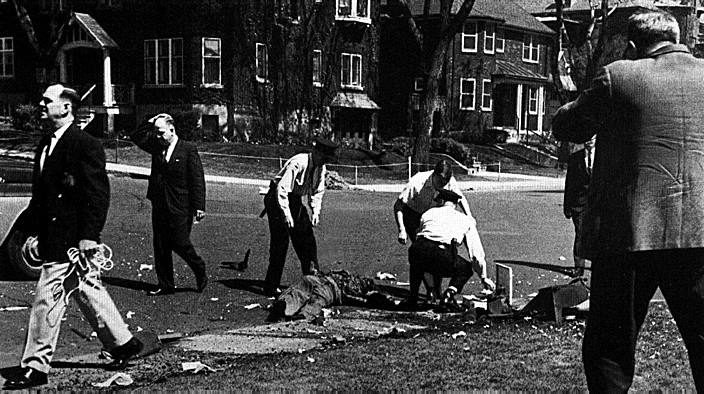Historically, it’s rare to encounter ideas as influential and powerful as those of Karl Marx (1818-1883). One of his most ardent followers was a member of the French-speaking minority of Canada. Pierre Vallières (1938-1998) called for violence and participated in terrorist attacks for a brief period during the 1970s. His most infamous book, White Niggers of America, published in 1968, singled him out as the brain behind the militantly separatist movement in Quebec. The Communist Manifesto was published exactly 120 years earlier, in 1848, yet its ideas, as well as others written elsewhere by Marx, could be linked directly to many passages in what is arguably the most controversial Canadian book published. The author tells his readers how he felt about that ideology in his formative years:
When I discovered Marxism, I felt as if I had found what I had always been seeking, what my father too had sought confusedly, what all proletarians seek: a truth, their truth, which can both reconcile them to life and enable them to work together for the only thing that is really worth living for—the revolution, the overthrow of capitalism, and the building of egalitarian social structures. 1Pierre Vallières, White Niggers of America, trans. Joan Pinkham (Toronto: McClelland and Stewart, 1970), 201.
The text in original French language: En découvrant le marxisme, j’eus l’impression de trouver ce que j’avais toujours cherché, ce que mon père aussi avait confusément cherché, ce que tous les prolétaires cherchent: une vérité, leur vérité, capable à la fois de les réconcilier avec la vie et de leur permettre de travailler ensemble à la seule chose qui vaille vraiment la peine d’être vécue: la révolution, le renversement du capitalisme et l’édification de structures sociales égalitaires. (p. 349.)
Seven significant ideas preached by Marx, a century earlier, appeared in White Niggers of America:
1. Race and racism are tools of the capitalist masters
As the title of the book suggests, he viewed the working-class majority of Quebec, the French-speaking province of Canada, as victims, not unlike African-Americans on the other side of the border. He endorsed a Marxist explanation to racism, as a divide-and-rule tactic by the capitalist class.
Pierre Vallières:
To be a “nigger” in America is to be not a man but someone’s slave. For the rich white man of Yankee America, the nigger is a sub-man. Even the poor whites consider the nigger their inferior. They say: “to work as hard as a nigger,” “to smell like a nigger,” “as dangerous as a nigger,” “as ignorant as a nigger.” Very often they do not even suspect that they too are niggers, slaves, “white niggers.” White racism hides the reality from them by giving them the opportunity to despise an inferior, to crush him mentally or to pity him. But the poor whites who despise the black man are doubly niggers, for they are victims of one more form of alienation-racism-which far from liberating them, imprisons them in a net of hate or paralyzes them in fear of one day having to confront the black man in a civil war. 2Pierre Vallières, White Niggers of America, trans. Joan Pinkham (Toronto: McClelland and Stewart, 1970), 21.
Karl Marx, in a letter written 1870:
Every industrial and commercial center in England now possesses a working class divided into two hostile camps, English proletarians and Irish proletarians. The ordinary English worker hates the Irish worker as a competitor who lowers his standard of life. In relation to the Irish worker, he regards himself as a member of the ruling nation and consequently he becomes a tool of the English aristocrats and capitalists against Ireland, thus strengthening their domination over himself. He cherishes religious, social, and national prejudices against the Irish worker. His attitude towards him is much the same as that of the “poor whites” to the Negroes in the former slave states of the U.S.A. …This antagonism is artificially kept alive and intensified by the press, the pulpit, the comic papers, in short, by all the means at the disposal of the ruling classes. This antagonism is the secret of the impotence of the English working class, despite its organization. It is the secret by which the capitalist class maintains its power. And the latter is quite aware of this.3De Melvin M. Leiman, Political Economy of Racism, (Chicago: Haymarket Books, 2010), 146.
2. “Liberating “the niggers of the entire world”: The communist vision is international
Pierre Vallières:
[I]n this world of money, violence, and oppression, freedom and peace can be won only by the strength of numbers and of arms. They already have the numbers. The arms will come in due time . . . on the day when they are sufficiently united to constitute the invincible army of their own liberation and the liberation of the millions of men on the five continents who are now enslaved to the interests of the “free world.” For the niggers of America are one with the niggers of the entire world. One with them in servitude. One with them in the struggle for liberation. One with them, when the time comes, in the final assault on imperialism and in the definitive victory of the human over the inhuman. One with them in the revolution of man and by man, in the grand event that will sweep away all the decay of the old system and prepare all humanity, that is, all men, to begin a new history, without masters or slaves, without war or racism, without banks or thieves. 4Pierre Vallières, White Niggers of America, trans. Joan Pinkham (Toronto: McClelland and Stewart, 1970), 53.
Karl Marx:
Though not in substance, yet in form, the struggle of the proletariat with the bourgeoisie is at first a national struggle. The proletariat of each country must, of course, first of all settle matters with its own bourgeoisie.5Karl Marx and Friedrich Engels, The Communist Manifesto, trans. Samuel Moore (London, United Kingdom: Penguin Classics, 2014), 339.
3. Class consciousness precedes revolutionary action
This idea stresses the fact that those who join the communist movement are ones who have become aware of their existence as an “exploited class.” All other identities are obstacles or just irrelevant, be that a religious affiliation (Catholic) or occupation (plumbers) or race. Once the exploited open their eyes to their existence as a single bloc of exploited masses, the Proletariat, then they would have achieved class-consciousness, which precedes a communist revolution.
Pierre Vallières:
Class consciousness is developing despite the long history of senseless hatreds that has so weakened the movement for workers’ demands in America in the last thirty years. It is a slow process, but little by little racism is giving way to solidarity. 6Pierre Vallières, White Niggers of America, trans. Joan Pinkham (Toronto: McClelland and Stewart, 1970), 51.
Karl Marx, in his manifesto:
The proletarian movement is the self-conscious, independent movement of the immense majority, in the interests of the immense majority.7Karl Marx and Friedrich Engels, The Communist Manifesto, trans. Samuel Moore (London, United Kingdom: Penguin Classics, 2014), 339.
4. Violence is necessary to overthrow the bourgeoisie
Pierre Vallières:
I believe that capitalist society can only be overthrown. It cannot wither away by itself, any more than the bourgeois class can commit suicide. 8Pierre Vallières, White Niggers of America, trans. Joan Pinkham (Toronto: McClelland and Stewart, 1970), 241.
Karl Marx, in his manifesto:
In depicting the most general phases of the development of the proletariat, we traced the more or less veiled civil war, raging within existing society, up to the point where that war breaks out into open revolution, and where the violent overthrow of the bourgeoisie lays the foundation for the sway of the proletariat.9Karl Marx and Friedrich Engels, The Communist Manifesto, trans. Samuel Moore (London, United Kingdom: Penguin Classics, 2014), 340.
5. On Taking over the means of production (factories, farms, railroads, etc.)
Pierre Vallières:
We want to replace [our economic system] with a society in which the producers (the workers) collectively own and administer their means of production and create, organize, and plan their relations of production and the distribution of their products in accordance with ultimate goals that they choose themselves, for the satisfaction of their true needs, in the framework of an absolute equality of rights, opportunities, and benefits. 10Pierre Vallières, White Niggers of America, trans. Joan Pinkham (Toronto: McClelland and Stewart, 1970), 237.
Karl Marx, in his major work, Das Kapital:
If this labourer were in possession of his own means of production, and was satisfied to live as a labourer, he need not work beyond beyond the time necessary for the reproduction of his means of subsistence, say 8 hours a day.11Karl Marx and Friedrich Engels, Capital: Volume One, trans. Samuel Moore (New York: Dover Publications, 2019), 336.
6. The traditional family has to be abolished
Pierre Vallières:
The terrible thing about the working-class family is the function, imposed on it by the present system of renewing and perpetuating the supply of slaves, of niggers, of cheap labor to be exploited, alienated and oppressed. And the inhuman thing about a working-class childhood is the child’s powerlessness to resist the conditioning not only of the system itself but of all the frustrations of the life around him, frustrations that are generated by the capitalist organization of society and that contaminate him even before he becomes aware of their existence. 12Pierre Vallières, White Niggers of America, trans. Joan Pinkham (Toronto: McClelland and Stewart, 1970), 85.
Karl Marx, in his manifesto:
Abolition of the family! Even the most radical flare up at this infamous proposal of the Communists. On what foundation is the present family, the bourgeois family, based? On capital, on private gain. In its completely developed form this family exists only among the bourgeoisie. But this state of things finds its complement in the practical absence of the family among the proletarians, and in public prostitution.13Karl Marx and Friedrich Engels, The Communist Manifesto, trans. Samuel Moore (London, United Kingdom: Penguin Classics, 2014), 348-349.
Marx criticizes the family structure, even in its best form, among the bourgeoisie, as one purely based on capital gain, as seen in arranged marriages between the wealthiest families in Europe whose schemes protect their land and wealth. It’s a much uglier picture among the poverty-stricken proletarian families where fathers sometimes marry off their daughters in a manner that could be described as prostituting their children.
7. Religion provides illusory happiness
Pierre Vallières:
Deep inside, I despised this life in which individual personal wills were equal to the extent that those wills wanted nothing, as Engels has so rightly put it, but simply obeyed, like sheep that graze without asking questions, because God has willed it so. That is the practical freedom of those who have been touched by God’s “grace”: the freedom to graze without complaining. Fortunately, God spares an increasing number of Québécois from his “grace.” That is why Quebec has ceased to be quiet colony of Washington and the Vatican. God and his Heaven are dying in the minds of the Québécois. Mindless obedience and sanctified servitude have ceased to be “virtues.” They are becoming what they have always been: meaningless phrases, chains that must be broken. The political and economic decolonization of Quebec will be accompanied by the de-alienation of the Québécois. The Church will not make so much money, but the people will be free. 14Pierre Vallières, White Niggers of America, trans. Joan Pinkham (Toronto: McClelland and Stewart, 1970), 172.
Karl Marx:
Religion is the sigh of the oppressed creature, the heart of a heartless world, and the soul of soulless conditions. It is the opium of the people.
The abolition of religion as the illusory happiness of the people is the demand for their real happiness. To call on them to give up their illusions about their condition is to call on them to give up a condition that requires illusions. The criticism of religion is, therefore, in embryo, the criticism of that vale of tears of which religion is the halo.
Criticism has plucked the imaginary flowers on the chain not in order that man shall continue to bear that chain without fantasy or consolation, but so that he shall throw off the chain and pluck the living flower. The criticism of religion disillusions man, so that he will think, act, and fashion his reality like a man who has discarded his illusions and regained his senses, so that he will move around himself as his own true Sun. Religion is only the illusory Sun which revolves around man as long as he does not revolve around himself.15John C. Raines, Marx on Religion, (Philadelphia: Temple University Press, 2002), 248.
Whether one agrees with the eighteenth-century German intellectual or not, it’s impossible to deny that his influence was and will still continue to be felt for generations to come.
You might also like:

Timeline of Quebec separatist movement
A brief historical outline of Quebec’s attempts at independence
BOOK: WHITE NIGGERS OF AMERICA

White Niggers of America: A call to arms by a Quebec terrorist
Summary of the book by Pierre Vallières, one of the leaders of Front de libération du Québec. Read the controversial quotes
BOOK: WHITE NIGGERS OF AMERICA
Endnotes





